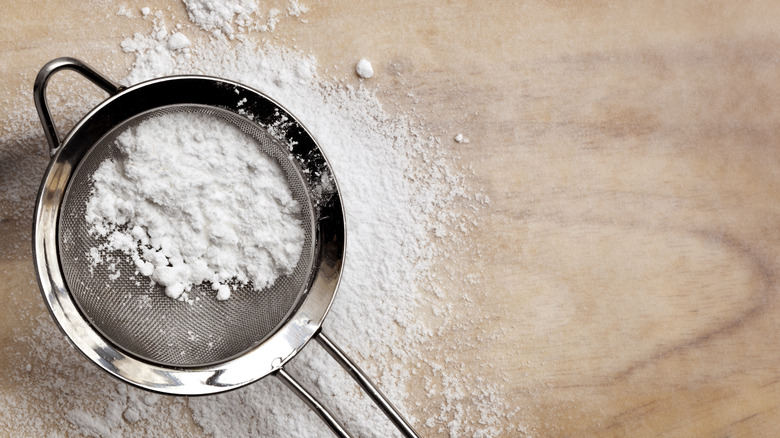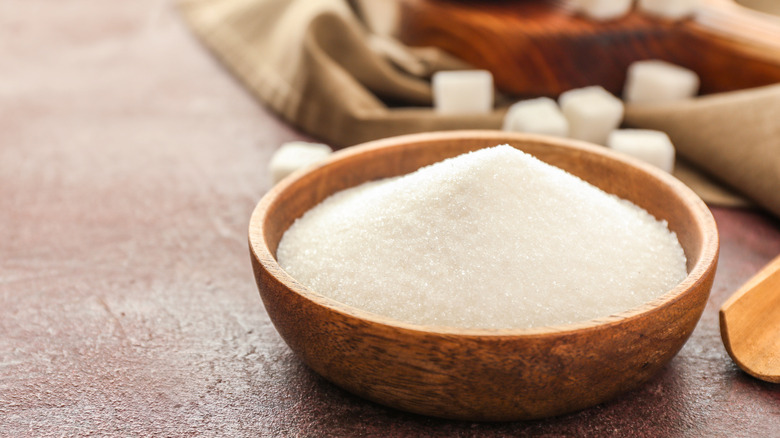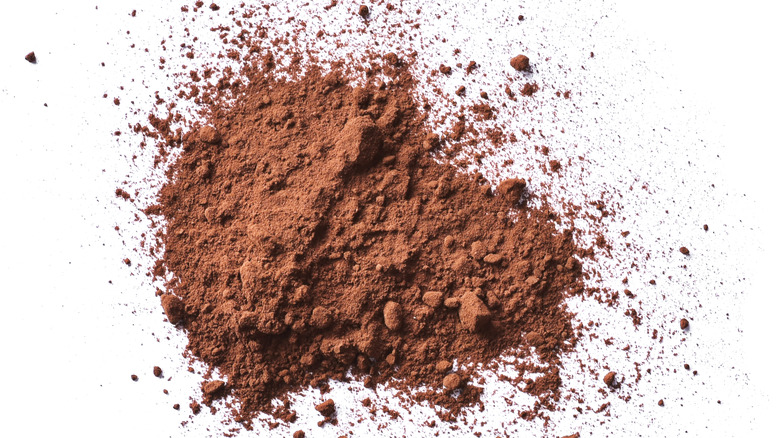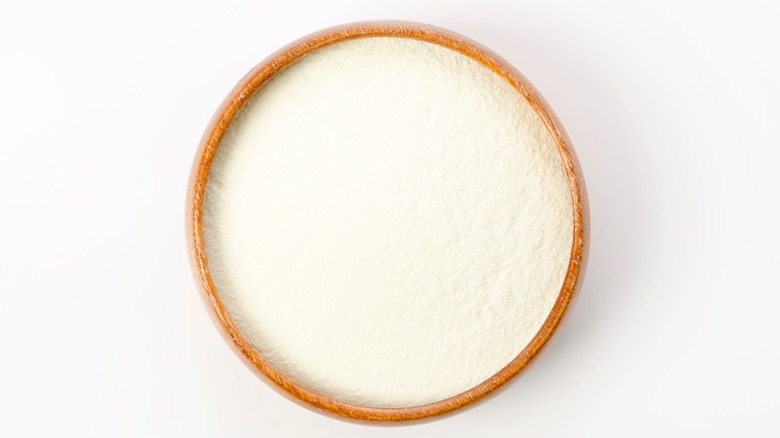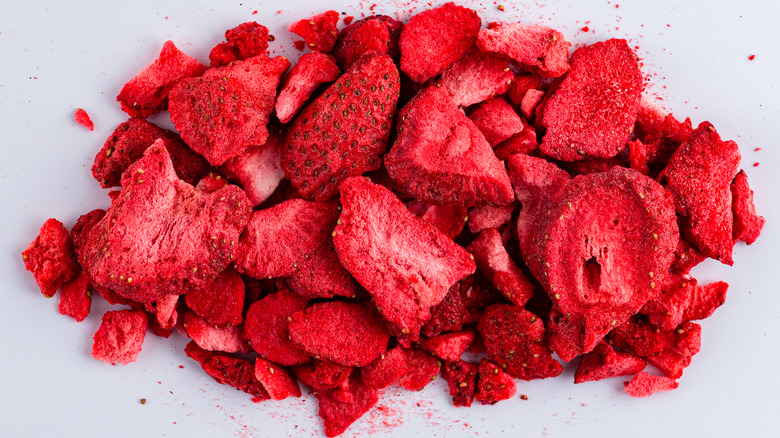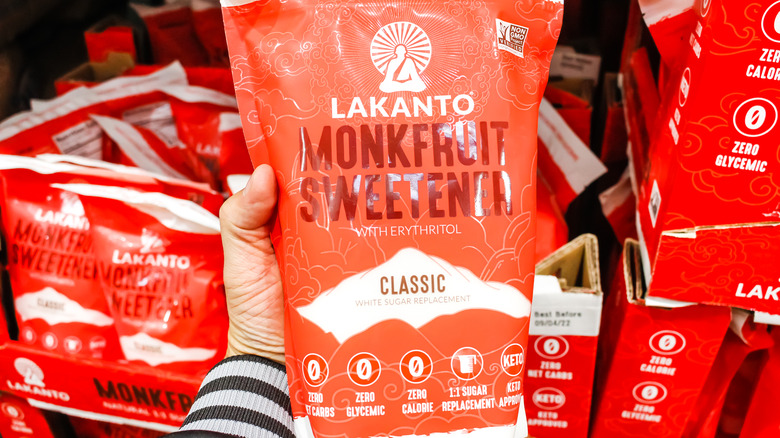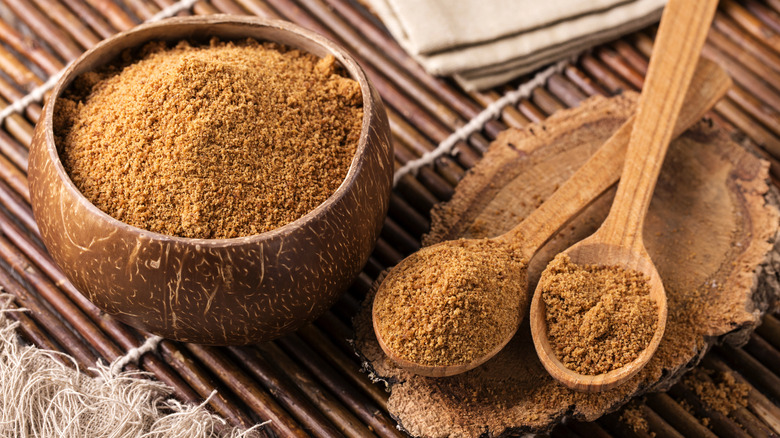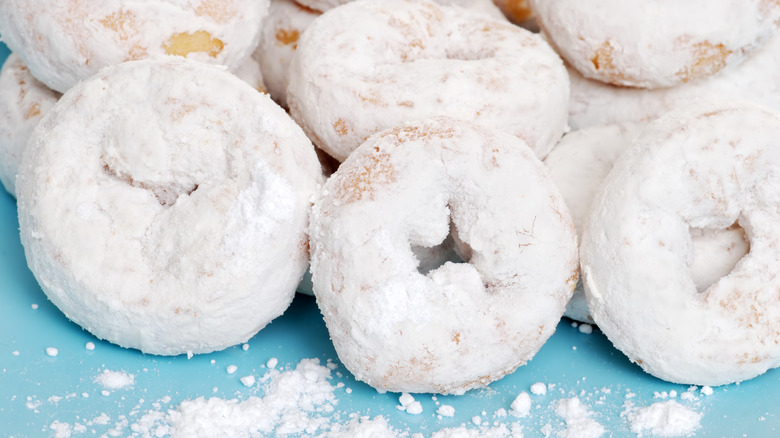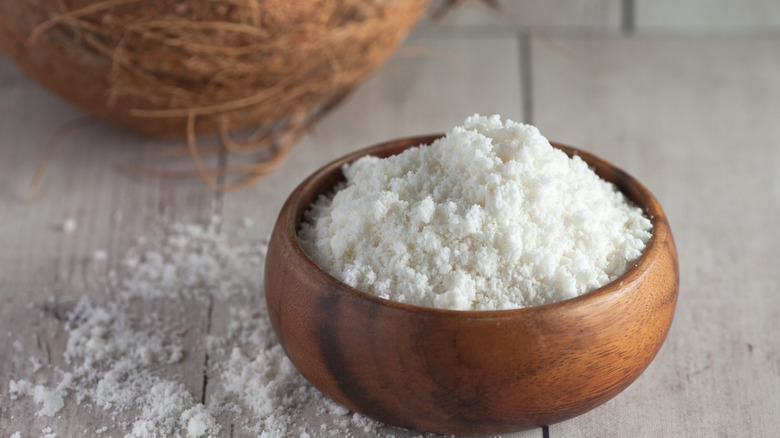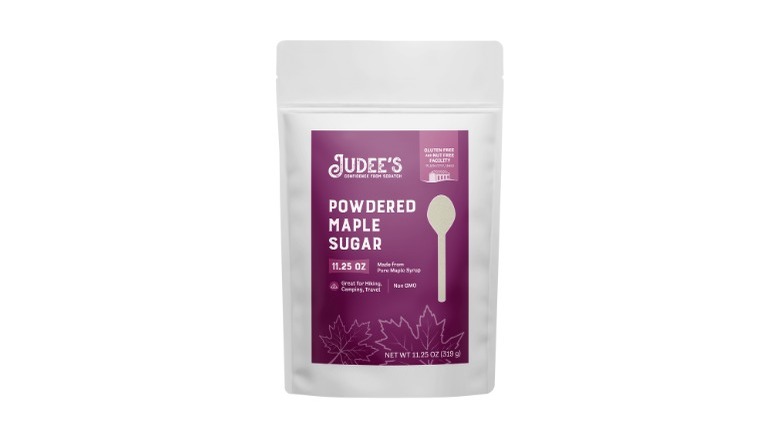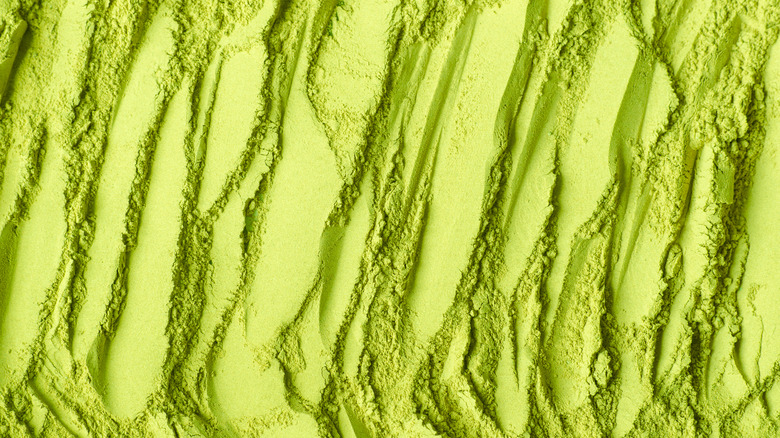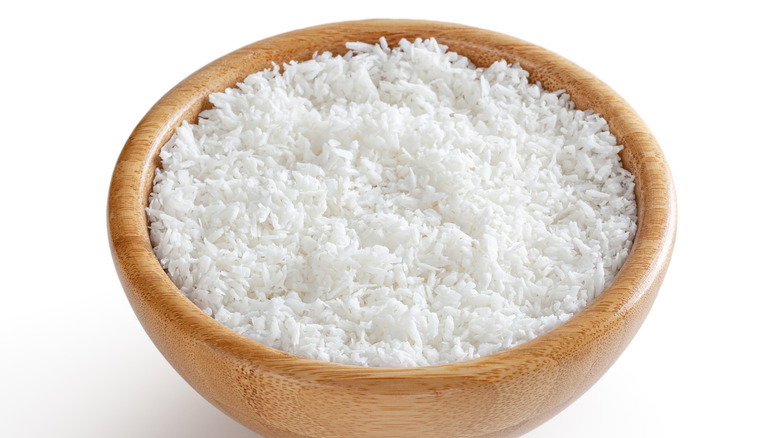12 Best Substitutes For Powdered Sugar
Powdered sugar is a product made from white, granulated sugar that is ground until it reaches a superfine state that resembles powder. Sometimes referred to as confectioners' sugar, icing sugar, or 10X (in professional spaces), this ingredient is most often used in baking and pastry applications. The very fine consistency of powdered sugar is important for certain uses as the sugar melts into whatever it's combined with much faster than granulated sugar. Most kinds of commercially produced powdered sugars have a small amount of cornstarch added to avoid caking.
The most common uses for powdered sugar are in frosting or icing, meringue, or as a dust on things like doughnuts or marshmallows. Depending on whether the powdered sugar is being used as an integral part of the recipe composition or as a dusting for garnish will determine what types of ingredients can work as a replacement. Read on to see the best substitutions for powdered sugar.
Granulated sugar and cornstarch
For recipes where the ultra-fine texture of powdered sugar simply can't be replaced, the simplest solution is to just make it yourself. Making your own powdered sugar is super easy, and involves just two ingredients. The first is white granulated sugar, the refined product made from either beets or sugar cane. The other is cornstarch, a kind of starch made from corn grain. By simply blending sugar in a high-speed blender or food processor to a fine powder and adding cornstarch, a virtually identical replacement to powdered sugar is created.
The perfect ratio for this trick is one cup of white sugar to one tablespoon of cornstarch. Once you have blended them together, you can substitute for powdered sugar in equal amounts. If the recipe calls for more than a cup or two of powdered sugar, you may be better off just running out for a bag of the commercially-produced stuff, as the homemade process can get a bit messy.
Cocoa powder
Cocoa powder is a powdered by-product of making chocolate. Once cocoa butter gets extracted from raw cacao beans during processing, leftover dried solids remain behind. These solids are then ground into a powder and sold as cocoa powder. Cocoa powder works wonders for adding a rich, chocolate flavor to baked goods and is often used to dust the top of a finished dessert, like on truffles or a classic tiramisu.
Cocoa powder can be substituted for powdered sugar in equal amounts in applications where the sugar is being used for dusting. Cocoa powder is often sold unsweetened, so keep that in mind when switching one for the other. You can also find sweetened cocoa powder, which could work better for substituting in something like a glaze or icing. For recipes where the melty, superfine nature of the sugar is critical to the composition of the dish (like in meringue or buttercream frosting), this substitution won't work at all.
Dry milk powder
Dry milk powder was invented in the 1800s as a way to preserve milk so it could be rehydrated later. It's an ingredient you should always keep in your pantry to add a rich and creamy texture to both sweet and savory recipes. Since milk itself contains natural sugars, dry milk powder has an inherent sweetness that isn't all that different from sugar, except that the sweetness comes from lactose instead of sucrose. This eliminates this substitution for people that suffer from dairy or lactose allergies, as well as those that avoid animal products.
To substitute dry milk powder for powdered sugar, blend one cup of dry milk powder with one cup of cornstarch. The resulting mixture should be light and fluffy with a touch of sweetness. Avoid using this substitution in icings, frostings, or glazes as the milk powder is simply not sweet enough to work as a replacement. Milk powder absorbs much more liquid than powdered sugar, so keep that in mind when working with this ingredient.
Ground freeze-dried fruit
Another ingredient that could work well as a substitute for powdered sugar is ground freeze-dried fruit. Unlike dehydrated fruit, freeze-dried fruit has a crisp, airy texture that turns into a super-fine powder once blended. Since most fruit contains a fair amount of natural sugar, this substitution can be a great alternative for those looking for less processed ingredients that still add a bit of sweetness. An added bonus is that, depending on the fruit used, there will also be a boost of vivid color without using harmful artificial dyes.
For recipes calling for a dusting or coating of powdered sugar, ground dehydrated fruit can be used in equal amounts. This ingredient will come with its own inherent flavor, which may be quite strong depending on the fruit (strawberries, for example, have a ripe, tart taste). Ground dehydrated fruit will likely not work as a substitution in baked goods as the composition is too different.
Hot cocoa mix
There is a surprising ingredient hidden in the back of most people's pantries that can sometimes work as a substitution for powdered sugar. Hot cocoa mix (the kind that comes in little packets and only requires you to add water) is a blend of cocoa powder, dry milk powder, and sugar. All of these ingredients are already on our list as great substitutions for powdered sugar in certain applications, so it makes sense that a packaged blend of all three can also work in a pinch.
This particular substitution is only going to work in very specific instances. For one, there is cocoa powder in the mix and that will add a chocolate flavor to the dish. The dry milk solids add a dairy product, which rules this out for the lactose intolerant or vegan crowd, and the sugar is usually granulated, which won't dissolve as quickly as powdered sugar. This substitution will work for chocolate desserts or in a chocolate glaze.
Powdered monkfruit sweetener
While some of the substitutions on this list work for those that simply find themselves out of powdered sugar, there may be another reason someone is looking to substitute. Specialty diets, health restrictions, and food aversions are all reasons someone might look for an alternative to sugar. Monkfruit (Siraitia grosvenorii), also known as luohan guo, is a fruit native to southern China. The fruit contains no sugar but produces the sensation of sweetness in the mouth, so it can be substituted for sugar safely for those that must avoid it for one reason or another.
Monkfruit sweetener manufacturers make a powdered monkfruit product that can be substituted for powdered sugar in a one-to-one ratio. This substitution can work in virtually any recipe that calls for powdered sugar, from buttercream frosting to powdered sugar-dusted doughnuts. The texture is extremely similar to the real stuff and can be sifted over a cake or melted into a glaze without issue.
Powdered coconut sugar
Coconut sugar, sometimes called coconut palm sugar, is a product made from the sap of the coconut tree. The sap is collected from the tree and then placed over heat until all the water is evaporated, leaving behind the coconut sugar. It has a similar crystalline texture to granulated sugar but has a brown color. While coconut palm sugar has a lower glycemic index than regular sugar, it still has the same amount of calories and carbohydrates as sugar and those with diabetic issues should keep that in mind. Some companies make a powdered version of coconut sugar that resembles the texture of regular powdered sugar and can be used as a substitute.
Powdered coconut sugar may have a slightly brownish hue compared to bone-white powdered sugar, but the flavor is remarkably similar. For those looking to stick to a paleo diet, powdered coconut sugar blended with a bit of tapioca starch is perfectly acceptable. The process to make this blend is exactly the same as the make-your-own powdered sugar that we already discussed above, but the ratio is one cup of coconut sugar to two teaspoons of tapioca flour.
Non-melting sugar
This next swap is more of a specialty product than something you might just so happen to have on hand, but it can work for certain applications. Non-melting powdered sugar is a special product made from dextrose, cornstarch, and palm oil. It resembles powdered sugar in every way, except for one crucial aspect: It will not melt when it comes in contact with oil or liquid. This amazing property is why it is the secret ingredient of commercial bakeries that need perfectly powdery confections that won't end up gummy or gluey after a few hours.
Non-melting powdered sugar can be used in exact quantities as powdered sugar, though it does have limitations. It is more expensive than powdered sugar pound-for-pound, so you likely won't want to swap it for uses where it isn't strictly necessary, like in buttercream frosting or cookies. For recipes that need a topping of powdered sugar, like lemon squares or muffins, this is an ideal substitute.
Coconut milk powder
Just like dry milk powder is a powdered version of cow's milk, coconut milk powder is the same product but made with coconut milk. The powder can be reconstituted into coconut milk, or kept in its powdered form. The flavor is rich and fatty, like coconut milk, with a distinctive coconut flavor. This substitution is a bit out there, especially compared to some of our other choices, and isn't likely something you might just happen to have on hand.
Dry coconut milk powder would work as an excellent substitute in a glaze, such as the kind used on pound cake or cinnamon rolls. We would recommend substituting this for powdered sugar in this application in a one-to-one ratio, keeping in mind that the sugar content is far lower so will be much less sweet. Check to see the total contents of your dry coconut milk powder before using, as some will be pure dried coconut milk and some will have some added gums or starches to keep from clumping.
Powdered maple sugar
One particularly unique item that can work as a substitute for powdered sugar is powdered maple sugar. This product is made from pure maple syrup, the sticky sweet sap of a maple tree. It has many of the same qualities as powdered sugar, except comes without any kind of added starches and has a distinct maple flavor. This might not be the handiest substitute on this list, but could be a good option for those that need to avoid white can sugar for any reason (such as a vegan diet).
This amazing product can be substituted for powdered sugar in any recipe, including icing, frosting, and glaze. We think it would be particularly delicious in place of powdered sugar dusted over the top of French toast. There is no cornstarch added, which could cause certain recipes for glazes to be a bit more runny. If that is the type of recipe where you are looking to substitute, we suggest adding one tablespoon of cornstarch per cup of powdered maple sugar to most closely resemble the results expected of powdered sugar.
Matcha powder
Matcha powder is the beautiful, lime green powder that is made from the Camellia sinensis plant. This product is used to make matcha tea, an earthy beverage that has been served in Japan for centuries. Its popularity has grown in recent years in Western culture, leading to an upward trend in all things matcha.
The culinary applications for matcha extend beyond just tea making, and the bold, green color can make a gorgeous addition to pastries and confections of all kinds. We've seen everything from cheesecake dusted with matcha to matcha muffins. This colorful powder is way too strong in flavor to replace powdered sugar in frosting or icing but makes a fabulous alternative in any recipe that calls for dusted powdered sugar as a garnish.
Traditional powdered matcha contains no sugar or sweeteners and offers only a bright hue and a deep, earthy flavor. This type is a good idea for uses where an added touch of sweetness isn't desired. Several companies offer a sweet matcha that is a bit closer to powdered sugar and could be replaced in a one-to-one ratio in certain dishes. The flavor of matcha is very strong, so avoid using more than a few tablespoons in any one recipe.
Desiccated coconut
Lacking both the sweetness and quick-melting properties of powdered sugar, this substitution can only work in a few different applications. Visually, the light, white, and fluffy properties of dried shredded coconut are not that unlike powdered sugar. In this way, it can be a great replacement coating on doughnuts, cakes, or cookies. It is naturally sugar and gluten-free, which makes it a solid choice for those looking to substitute due to dietary restrictions.
If you choose this replacement, make sure you look for either desiccated coconut or dried shredded coconut. Sweetened coconut tends to have a gooey texture and won't work at all in the ways we've suggested. Flaked coconut could work if there's no added sugar, but will visually look very different so that's something to think about. Coconut does have a distinctive flavor which will alter the taste of the final dish, which is another important characteristic to keep in mind.
